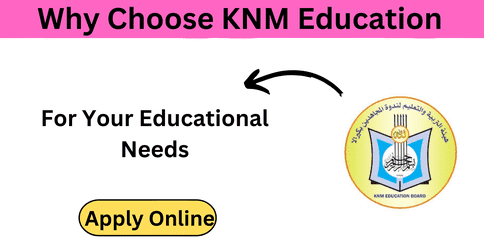KNM Education Board: In today’s rapidly evolving educational landscape, choosing the right institution can make all the difference in a student’s academic journey.
The KNM Education Board stands out as a beacon of modern education, offering a unique blend of traditional values and cutting-edge learning approaches. With its commitment to providing high-quality English textbooks and innovative teaching methods,
Table of Contents
The board has gained recognition for its role in shaping well-rounded individuals ready to face the challenges of the 21st century.
This article delves into the reasons why the KNM Education Board is an excellent choice for students and parents alike. We’ll explore the board’s rich history and legacy, examine its comprehensive curriculum offerings, and highlight its forward-thinking teaching methodologies.
By the end, readers will have a clear understanding of how the KNM Education Board is setting new standards in education and preparing students for success in an increasingly competitive world.
History and Legacy of KNM Education Board
The KNM Education Board has its roots in the Kerala Muslim Renaissance, a social revolution that began over a century ago. This movement emerged in response to the deplorable situation of Muslims in Kerala during the second half of the nineteenth century.
At that time, the community was economically exhausted and had strayed from the true teachings of Islam, indulging in superstitions and innovations.
Origins of KNM Education Board
In the 1950s, the Kerala Nadvathul Mujahideen (KNM) was formed to address the need for a unified platform for scholars and laypeople alike.
The organization, also known as the Islahi Movement, aimed to revert the Muslim community to the teachings of the Qur’an and Hadith, moving away from superstitions and innovations.
Key Figures in Its Establishment
The KNM was officially formed on April 20, 1950, in a meeting held at the office of “Al Manar” Magazine in Calicut. Key figures in its establishment included K.M. Moulavi as President and N.V. Abdul Salam Moulavi as General Secretary.
Other notable founders were P.K. Moosa Moulavi, A.K. Abdullatif Moulavi, and M. Kunhoi Vaidyar.
Evolution Over the Years
As the organization grew, it formed various subsidiaries and sub-committees to streamline its operations. These included ISM for youth, MSM for students, and MGM for women. The KNM expanded its activities to include regular lectures, awareness programs, state conferences, Islamic exhibitions, and campaigns.
In 1964, the KNM founded Jamia Nadwiyya Edavanna (JNE), a group of educational institutions that has since grown into a large campus spread over 27 acres. JNE offers a wide range of educational programs, from nursing to arts and sciences.
The KNM Education Board has played a crucial role in shaping modern Islamic education in Kerala. It implemented religious education on a scientific basis by starting madrasahs for religious studies.
The board developed a syllabus and curriculum for each class based on the Qur’an and the Prophet’s teachings, similar to school education. This approach initially faced opposition from orthodox communities but eventually gained acceptance.
In recent years, the KNM Education Board has continued to innovate, initiating the Almanar preschool education system in Kerala, which has become one of the best pre-primary schools in the state.
As of 2021, the KNM observed a public campaign celebrating 100 years of Kerala Muslim Renaissance, marking its ongoing commitment to social and educational reform within the Muslim community.
Read More: New Education Policy 2024
Comprehensive Curriculum Offerings
The KNM Education Board offers a comprehensive curriculum that combines Islamic studies, modern education, and language options. This approach provides students with a well-rounded learning experience, preparing them for both spiritual growth and academic success.
Islamic Studies Programs
The Islamic studies program forms the core of the curriculum, covering the fundamentals of the religion. Students gain a deep understanding of Islamic teachings, history, and culture through courses on the Quran, Hadith, and Fiqh.
The board has implemented religious education on a scientific basis, developing a syllabus and curriculum for each class based on the Qur’an and the Prophet’s teachings. This systematic approach prepares students for careers in religious leadership, academia, and community service.
Modern Education Integration
To ensure students receive a balanced education, the KNM Education Board integrates modern educational approaches with traditional Islamic knowledge. The curriculum includes a range of academic subjects such as mathematics, science, and humanities.
This integration prepares students for further studies and future careers in various fields. Additionally, the board offers specialized programs like:
- ECGC Educational and Career Guidance Center: Provides education and career guidance, coaching for competitive exams, and parent guidance.
- Renai Academy: Offers practical training in visual media, including courses in designing, video editing, digital marketing, and online broadcasting.
Language Options
The KNM Education Board recognizes the importance of language skills in today’s global society. The curriculum includes language options such as Arabic, English, and Malayalam.
This multilingual approach allows students to develop proficiency in multiple languages, enhancing their global communication skills. The board believes in a perfect mix of teaching, learning, and discipline, which is reflected in their language curriculum.
The KNM Education Board’s comprehensive curriculum, with its focus on Islamic studies, modern education, and language options, provides students with a strong foundation for their academic and professional futures.
By combining traditional values with contemporary knowledge, the board prepares students to face the challenges of the 21st century with confidence and competence.
Innovative Teaching Methods
The KNM Education Board has embraced modern educational approaches to enhance the learning experience for students. By combining traditional values with contemporary teaching methods, the board aims to prepare students for the challenges of the 21st century.
Technology-Enhanced Learning
The board has made significant strides in incorporating technology into its educational programs. One notable initiative is the introduction of an online madrasah system.
This platform caters to students who cannot attend regular madrasah classes, ensuring that religious education remains accessible to all. The online system allows for flexible learning schedules and provides a wider reach for the board’s educational offerings.
In addition to the online madrasah, the KNM Education Board has expanded its textbook offerings. Initially publishing textbooks in Arabic-Malayalam in the 1950s, the board later made them available in Malayalam.
Currently, textbooks are accessible in English, Kannada, and even Braille, making education more inclusive and accommodating diverse learning needs.
Qualified Faculty
The KNM Education Board recognizes the importance of well-trained educators in delivering quality education. The board emphasizes the development of trainee teachers, focusing on essential skills such as communicative ability, self-esteem, and aptitude.
These future educators are groomed to meet the standards of the 21st century, with emphasis on hard work, self-management, decision-making, stress and conflict management, and leadership skills.
Personalized Learning Approaches
To cater to individual student needs, the KNM Education Board has implemented various personalized learning approaches. These include:
- Group discussions: Encouraging collaborative learning and idea exchange.
- Peer learning: Facilitating knowledge sharing among students.
- Cooperative learning environments: Fostering teamwork and mutual support.
The board also focuses on creating a positive classroom management system, emphasizing time-on-task and the effective use of instructional techniques. This approach helps to maintain student engagement and optimize learning outcomes.
By combining technology-enhanced learning, qualified faculty, and personalized learning approaches, the KNM Education Board strives to create an educational environment that is both innovative and effective in meeting the needs of modern students.
Conclusion
The KNM Education Board stands out as a shining example of forward-thinking education in Kerala. Its blend of Islamic studies, modern subjects, and language options gives students a well-rounded learning experience.
By using technology and personalized teaching methods, the board prepares students to tackle real-world challenges head-on.
At its core, the KNM Education Board has a profound impact on shaping well-rounded individuals ready for the future. Its rich history, comprehensive curriculum, and innovative approaches make it a top choice for students and parents alike.
As education keeps evolving, the KNM Education Board remains committed to providing top-notch learning experiences that bridge tradition and modernity.
FAQs
1. How can I select the right educational board?
Choosing the appropriate educational board involves understanding the various options available, such as the Central Board of Secondary Education (CBSE), the Indian Certificate of Secondary Education (ICSE), and various State Boards.
2. Which educational board is considered the best?
In India, several education boards are highly regarded, including State Boards, the Central Board of Secondary Education (CBSE), the Indian Certificate of Secondary Education (ICSE),
the Council for the Indian School Certificate Examination (CISCE), the National Institute of Open Schooling (NIOS), and the International Baccalaureate (IB).
3. Why is a knowledge-based education significant?
Knowledge-based education is crucial because it fosters a deeper understanding by connecting learning to real-world experiences and examples, thereby enriching students’ lives and enhancing their comprehension.
4. What function does a school education board serve?
An education board is responsible for setting learning standards, designing the curriculum, and establishing the educational framework that influences a student’s educational journey. This role is critical as it has profound implications for a child’s academic growth and development.









